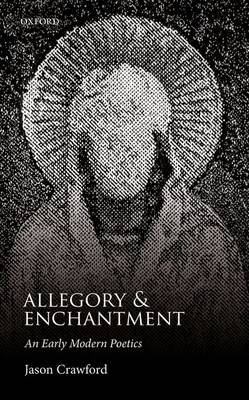
Stock image for illustration purposes only - book cover, edition or condition may vary.
Allegory and Enchantment: An Early Modern Poetics
Jason Crawford
€ 127.70
FREE Delivery in Ireland
Description for Allegory and Enchantment: An Early Modern Poetics
Hardcover. Jason Crawford explores the emergence of modernity by investigating the early modern poetics of allegorical narrative. He focuses on four major allegorical narratives produced in the period: William Langland's Piers Plowman, John Skelton's The Bowge of Courte, Edmund Spenser's The Faerie Queene, and John Bunyan's The Pilgrim's Progress. Num Pages: 240 pages. BIC Classification: 2AB; DSBB; DSBD. Category: (P) Professional & Vocational; (U) Tertiary Education (US: College). Dimension: 145 x 277 x 21. Weight in Grams: 402.
What is modernity? Where are modernitys points of origin? Where are its boundaries? And what lies beyond those boundaries? Allegory and Enchantment explores these broad questions by considering the work of English writers at the threshold of modernity, and by considering,in particular, the cultural forms these writers want to leave behind. From the fourteenth to the seventeenth centuries, many English writers fashion themselves as engaged in breaking away from an array of old idols: magic, superstition, tradition, the sacramental, the medieval. Many of these writers persistently use metaphors of disenchantment, of awakening from a broken spell, to describe their self-consciously modern orientation toward a medieval past. And many of them associate that repudiated past with the dynamics and conventions of allegory. In the hands of the major English practitioners of allegorical narrativeWilliam Langland, John Skelton, Edmund Spenser, and John Bunyanallegory shows signs of strain and disintegration. The work of these writers seems to suggest a story of modern emergence in which medieval allegory, with its search for divine order in the material world, breaks down under the pressure of modern disenchantment. But these four early modern writers also make possible other understandings of modernity. Each of them turns to allegory as a central organizing principle for his most ambitious poetic projects. Each discovers in the ancient forms of allegory a vital, powerful instrument of disenchantment. Each of them, therefore, opens up surprising possibilities: that allegory and modernity are inescapably linked; that the story of modern emergence is much older than the early modern period; and that the things modernity has tried to repudiatethe old enchantmentsare not as alien, or as absent, as they seem.
Product Details
Publisher
Oxford University Press
Format
Hardback
Publication date
2017
Condition
New
Weight
401g
Number of Pages
238
Place of Publication
Oxford, United Kingdom
ISBN
9780198788041
SKU
V9780198788041
Shipping Time
Usually ships in 15 to 20 working days
Ref
99-6
About Jason Crawford
Jason Crawford (PhD, Harvard) is Assistant Professor of English at Union University, where he teaches and writes about early modern literature and culture. His essays have appeared in the Journal of Medieval and Early Modern Studies, Religion & Literature, and English Studies.
Reviews for Allegory and Enchantment: An Early Modern Poetics
This challenging study will leave readers thinking long and hard about the tension between truth-telling and story-telling and how we define our relation to the past.
John Farrell, Los Angeles Review of Books
Crawford's readings are generally illuminating ... Jason Crawford's Allegory and Enchantment is an intelligent and ambitious work that confirms its author's knowledge of the relevant texts and scholarship.
Richard C. McCoy, Modern Philology
A robust and penetrating account of the vexed history of allegory from antiquity through touchstone allegorical texts in early modernity.
Studies in English Literature: 1500-1900
A wide-ranging book.
Ayesha Ramachandran (Yale University), The Spenser Review
Crawford's insightful readings of a wide range of literary and philosophical texts will be attractive to a large spectrum of readers, and each chapter offers fresh and compelling interpretations of its central sources. As such, the book promises to be one with which future scholarship on allegory must reckon and contend.
Julianne Sandberg, Renaissance Quarterly
the book is invaluable for early modern researchers and academics interested in religion, allegory, literary constructions of enchantment and, more prominently, disenchantment.
Frank Swannack, University of Salford, Parergon
John Farrell, Los Angeles Review of Books
Crawford's readings are generally illuminating ... Jason Crawford's Allegory and Enchantment is an intelligent and ambitious work that confirms its author's knowledge of the relevant texts and scholarship.
Richard C. McCoy, Modern Philology
A robust and penetrating account of the vexed history of allegory from antiquity through touchstone allegorical texts in early modernity.
Studies in English Literature: 1500-1900
A wide-ranging book.
Ayesha Ramachandran (Yale University), The Spenser Review
Crawford's insightful readings of a wide range of literary and philosophical texts will be attractive to a large spectrum of readers, and each chapter offers fresh and compelling interpretations of its central sources. As such, the book promises to be one with which future scholarship on allegory must reckon and contend.
Julianne Sandberg, Renaissance Quarterly
the book is invaluable for early modern researchers and academics interested in religion, allegory, literary constructions of enchantment and, more prominently, disenchantment.
Frank Swannack, University of Salford, Parergon
